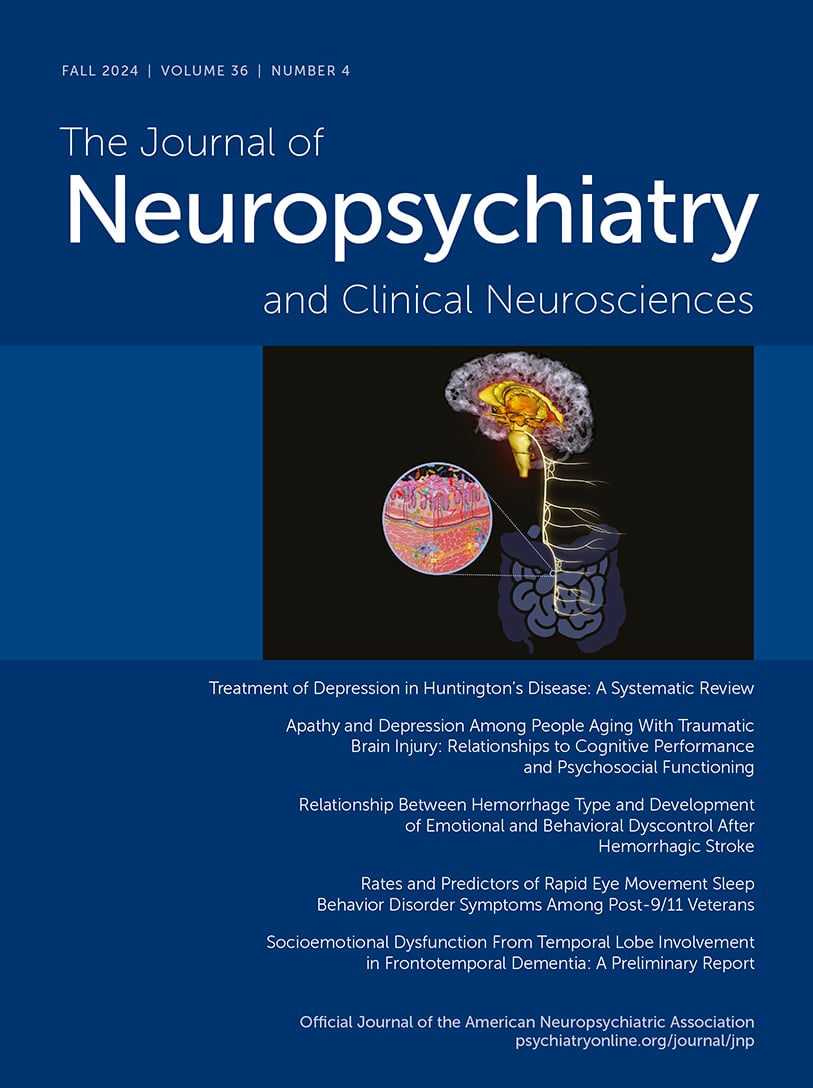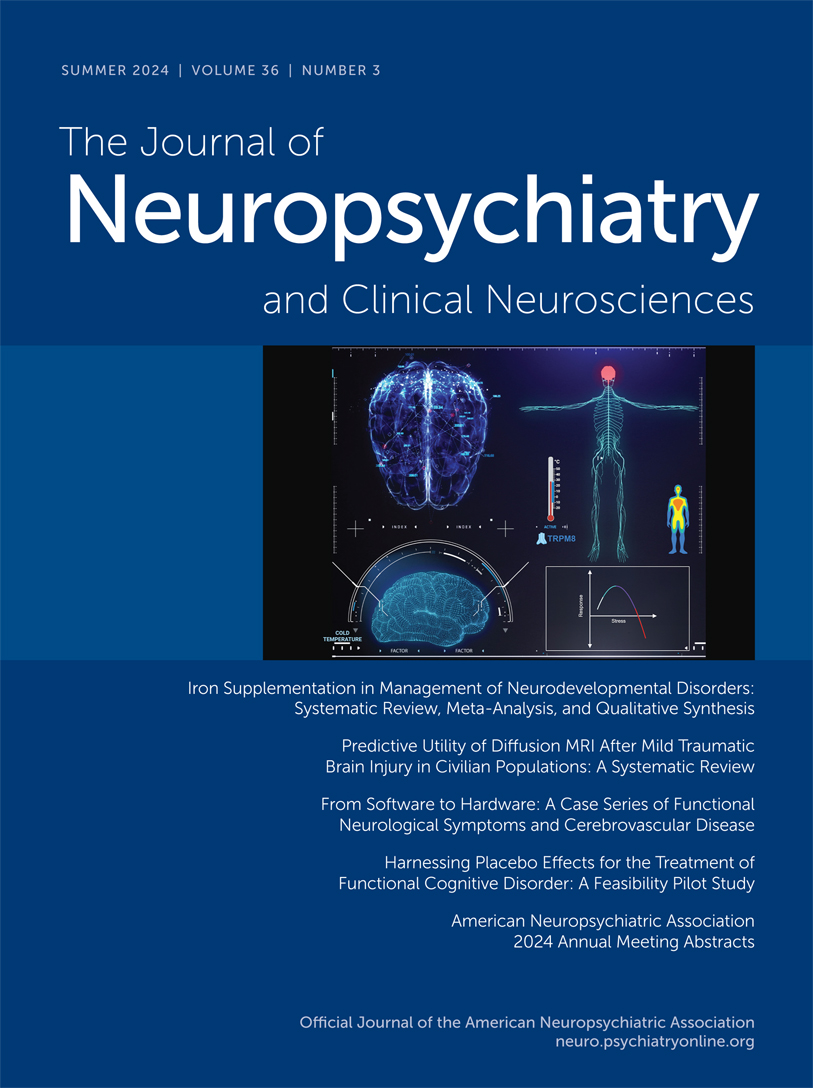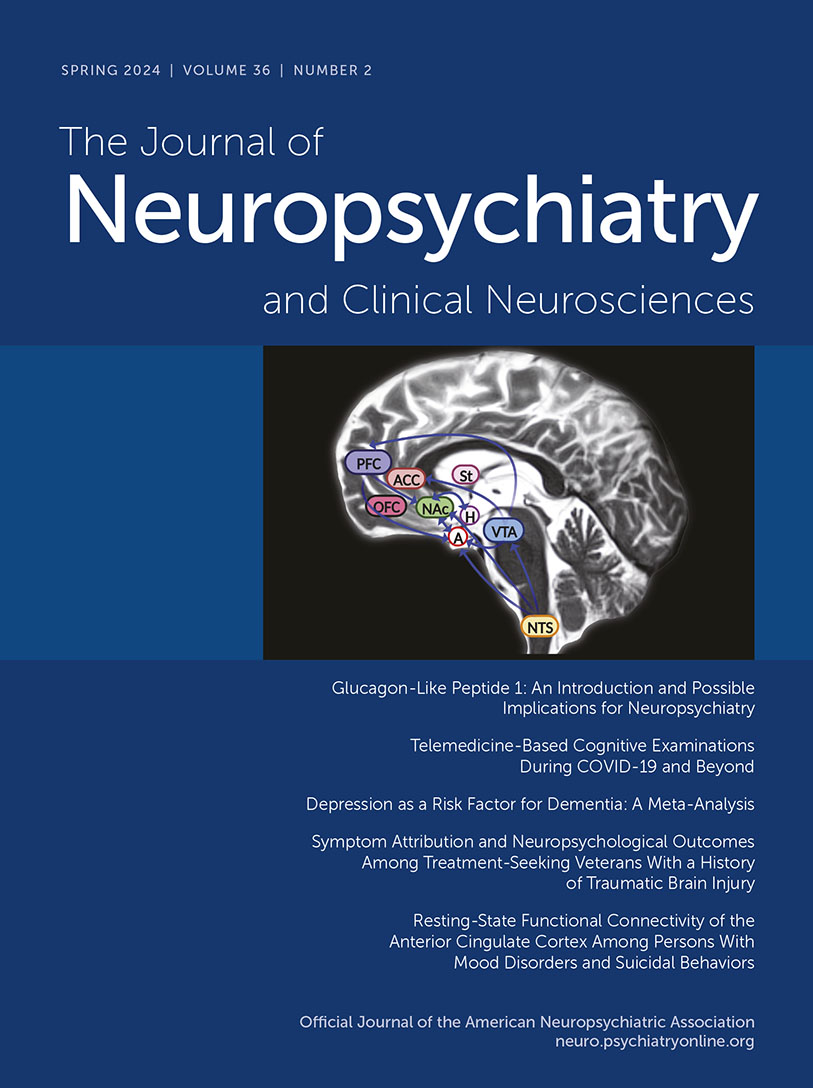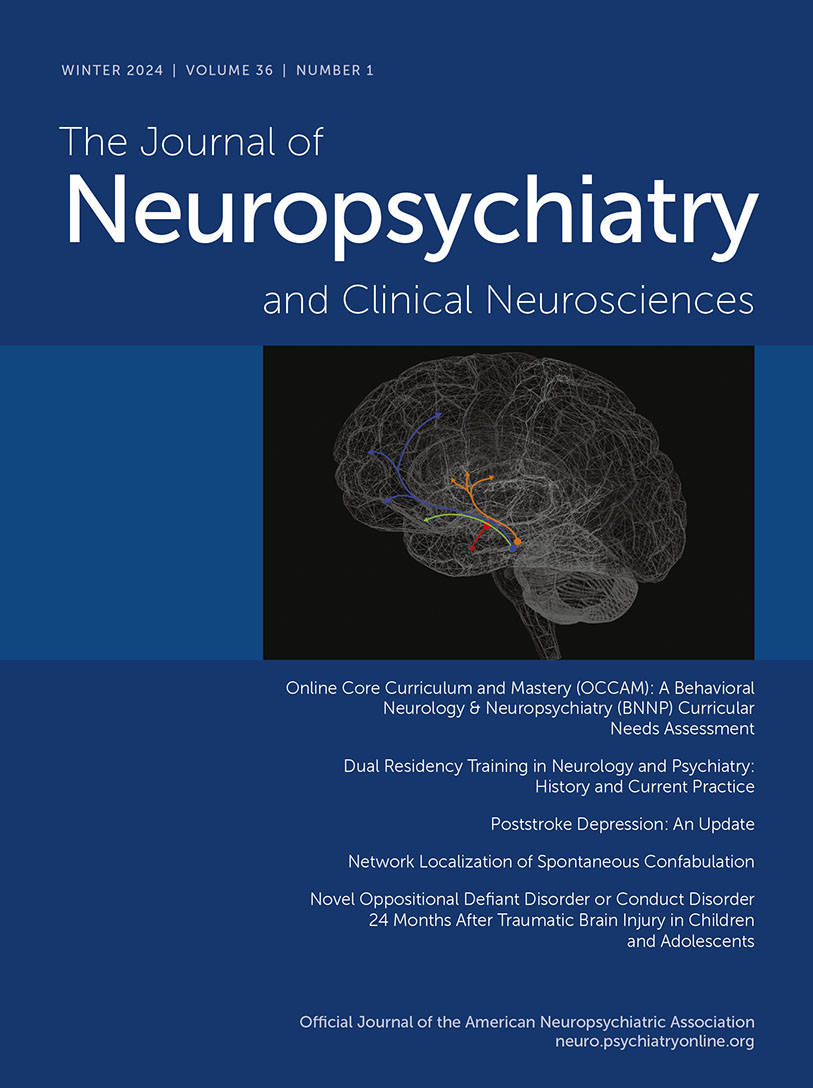The Journal of Neuropsychiatry and Clinical Neurosciences
- Volume 17
- Number 4
- November 2005
Windows to the Brain
Special Article
Publication date: 01 November 2005
Pages447–454Pseudobulbar affect (PBA) is an affective disinhibition syndrome associated with various neuropathologies, which is characterized by involuntary and inappropriate outbursts of laughter and/or crying. The PBA syndrome can be socially and occupationally ...
https://doi.org/10.1176/jnp.17.4.447Publication date: 01 November 2005
Pages455–464A four-step approach for developing diagnostic tests in psychiatry is proposed. The approach was applied to a promising finding (increased electroencephalogram [EEG] Theta in attention deficit hyperactivity disorder [ADHD]). A meta-analysis for the effect ...
https://doi.org/10.1176/jnp.17.4.455Regular Article
Publication date: 01 November 2005
Pages465–471Catechol-O-methyltransferase (COMT) is thought to functionally modulate dopamine neurons, thus likely influencing frontal-executive functioning. High enzyme activity (COMT Val) and low enzyme activity (COMT Met) are functional polymorphisms resulting from ...
https://doi.org/10.1176/jnp.17.4.465Publication date: 01 November 2005
Pages472–477Neurological soft-sign abnormalities have been implicated in obsessive-compulsive disorder (OCD). This first comprehensive data analysis evaluated the association between baseline neurological soft signs and treatment response in 117 OCD patients treated ...
https://doi.org/10.1176/jnp.17.4.472Publication date: 01 November 2005
Pages478–485Between 1973 and 1995, a total of 76 patients were treated with bilateral stereotactic, orbitomedial lesions for resistant severe depression at the Neuropsychiatric Institute, Sydney, Australia. On follow up after a mean 14.4 years, 24 (31.6%) subjects ...
https://doi.org/10.1176/jnp.17.4.478Publication date: 01 November 2005
Pages486–488Stroke is a leading cause of disability globally. Although neuropsychiatric symptoms are produced by stroke and adversely effect stroke outcome, it is unclear whether neuropsychiatric outcome can be improved by acute stroke treatment. The authors reviewed ...
https://doi.org/10.1176/jnp.17.4.486Publication date: 01 November 2005
Pages489–495This study characterizes the type and timing of psychiatric manifestations in sporadic Creutzfeldt-Jakob disease (sCJD). Historically, sCJD has been characterized by prominent neurological symptoms, while the variant form (vCJD) is described as primarily ...
https://doi.org/10.1176/jnp.17.4.489Publication date: 01 November 2005
Pages496–502Individuals with manifest Huntington’s disease (HD) were interviewed with regard to the presence, frequency, and severity of depression symptoms to better characterize depressed mood across the disease course in HD. Rates of depression were more than ...
https://doi.org/10.1176/jnp.17.4.496Publication date: 01 November 2005
Pages503–509The authors investigated whether war-related posttraumatic stress disorder (WR-PTSD) is associated with a postmortem change in neuronal counts in the locus coeruleus (LC) since enhanced central nervous system (CNS) noradrenergic postsynaptic ...
https://doi.org/10.1176/jnp.17.4.503Publication date: 01 November 2005
Pages510–516Findings about the impairment of executive functions in schizophrenia are not conclusive. The authors hypothesized that the severity of the impairments in the abilities that comprise EF might be different. Forty patients were assessed with a comprehensive ...
https://doi.org/10.1176/jnp.17.4.510Publication date: 01 November 2005
Pages517–525Timing deficits in schizophrenia have been noted in several behavioral studies. However, the involvement of mediating factors, such as inattention, has not been ruled out as contributing to these effects. Mismatch negativity (MMN), an electrophysiological ...
https://doi.org/10.1176/jnp.17.4.517Publication date: 01 November 2005
Pages526–532Eye movement desensitization and reprocessing (EMDR) has been shown to be an effective treatment for posttraumatic stress disorder (PTSD). In this study, the authors evaluated the effectiveness and physiological effects of EMDR in police officers involved ...
https://doi.org/10.1176/jnp.17.4.526Publication date: 01 November 2005
Pages533–540This study evaluated the clock drawing test (CDT), a screening test sensitive to executive function, in 70 elderly psychiatric consultation patients. The CDT was compared to the Mini-Mental Status Examination (MMSE) on associations with psychiatric ...
https://doi.org/10.1176/jnp.17.4.533Clinical and Research Reports
Publication date: 01 November 2005
Pages541–543Previous studies have reported associations between apolipoprotein E (APOE) genotype, cognitive function, and psychopathology in psychiatric populations. The authors investigated the associations between APOE allele status, memory function, and ...
https://doi.org/10.1176/jnp.17.4.541Publication date: 01 November 2005
Pages544–547Based on five cases of obsessive-compulsive spectrum disorders in rheumatic fever patients, the authors discuss the range of psychiatric disorders associated with poststreptococcal autoimmune reactions and its implications for immunology/CNS interaction.
https://doi.org/10.1176/jnp.17.4.544Publication date: 01 November 2005
Pages548–551Nine aggressive, retarded patients refractory to conventional care at a maximum security hospital were given a 3-month course of cranial electrotherapy stimulation. Aggressive episodes declined 59% from baseline; seclusions were down 72%; restraints were ...
https://doi.org/10.1176/jnp.17.4.548Publication date: 01 November 2005
Pages552–555Delayed disease progression and symptomatic improvement occur with cholinesterase inhibitors (ChEIs) in dementia with Lewy bodies (DLB). In this study, complications (insomnia, dyskinesias, agitation, and delirium) occurred in three patients switched from ...
https://doi.org/10.1176/jnp.17.4.552Book Reviews
Letter
Correction
Appreciation
Calendar
Past Issues
View Issues Archive
Vol. 36 | No. 4

Vol. 36 | No. 3

Vol. 36 | No. 2
